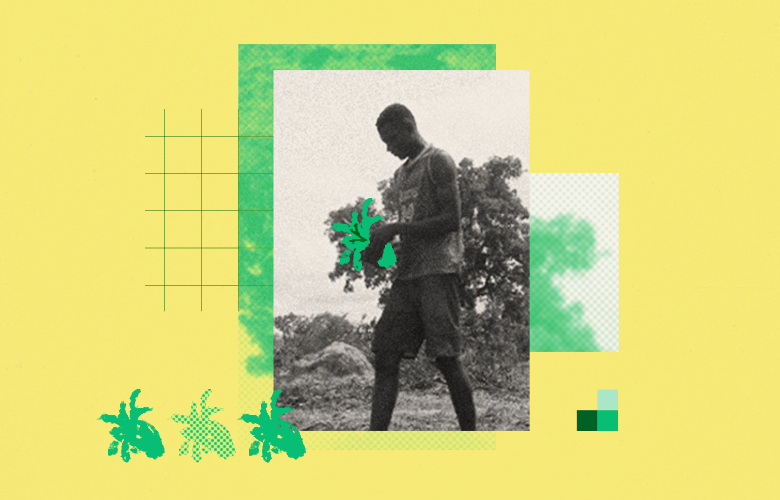
In the heart of Sitooukéne, a small village in Senegal’s Zinguinchor region, where the nearest source of vegetable crops or fruit trees is more than 30 kilometers away, Lassana, a 20-year-old visionary, is turning dreams into reality. Driven by a deep love for his homeland and community, this high school student has achieved something remarkable—turning barren land into a thriving green space that offers new hope and much-needed produce.
The Journey Begins
Lassana’s journey began with a dream of becoming an entrepreneur, but the lack of resources in his village posed a significant challenge. His drive to create a green space for his community was deeply inspired by his participation in APTE-Senegal’s employability and entrepreneurship training programs, conducted by EDC from 2017 to 2021. He recognized that addressing his community’s critical needs would demand considerable effort and support. Among the many lessons Lassana attended, EDC’s Work Ready Now program stood out. It offered hands-on training, skills development, and inspiring site visits, which sparked ideas for income-generating activities and resource mobilization through savings and credit groups.
During one of the site visits, Lassana visited Mboro Camp and met Mr. Faye, an entrepreneur who left a lasting impression on him. Mr. Faye’s lesson on marketing, illustrated with real-world examples from fruit production, ignited Lassana’s imagination and filled him with confidence. He left the session brimming with ideas and a newfound confidence that he could turn his dream into a viable business. Inspired by Mr. Faye, Lassana moved forward with his project.
“I saw the solution in creating a green space that covers several hectares,” Lassana explained. “A large plot to be allocated to the village women for cultivation, and a second plot allocated to secondary school students who will visit in groups to learn about agriculture and experience hands-on work.”
Lassana’s decision to allocate land specifically to women was both a practical choice and a transformative one. He understood the daily struggles of his community and recognized that providing space for women meant giving them the opportunity to grow—both physically and figuratively. This initiative allowed women to take on leadership roles, acquire new knowledge, and gain financial independence. For example, some of the women were able to finance their children’s education from their share of crops in Lassana’s plot.
Lassana also allocated a second plot of land specifically for high school students who, like him, needed guidance and mentorship. Through this initiative, Lassana demonstrated that his vision wasn’t just about his own future—it was also about creating opportunities for others in his community.
Inspiring the Future
Today, Lassana’s farm is more than just a business. It’s a beacon of sustainable development. By expanding access to green space, Lassana expanded opportunities for inclusion and growth within his community. For example, working alongside his community members and family, Lansana sold 100 bags of peanuts at 20,000 francs each in the 2023 harvest, for a total of 2,000,000 CFA francs ($3,336 USD).
What was once barren land has been transformed into a thriving hub of activity. His farm now provides fresh produce and creates employment opportunities for other young people. It has become a source of life, prosperity, and hope for the future.
The legacy of Lassana’s success continues to inspire the youth of his region, encouraging them to participate in projects such as EDC’s Vocational Training and Integration Project (PFPI; Projet de Formation Professionnelle et d’Insertion), which builds on the success of APTE-Senegal. Funded by the Mastercard Foundation, PFPI focuses on employability and entrepreneurship programs in schools, with a particular emphasis on accessibility for women, where the hope is to have 70% female enrollment. With a focus on green income-generating activities, PFPI is nurturing the next generation of young entrepreneurs and employment-ready youth who will carry the torch of sustainable development.
In just two years, PFPI and EDC-Senegal have achieved significant progress. They have:
- Partnered with 114 vocational schools, 150 middle schools, 1 university, and 1 technical institute.
- Launched 15 green income-generating activities in schools, benefiting 2,670 young people.
By 2028, the project aims to engage 65,000 middle school students, 64,300 technical education apprentices, 51,500 other apprentices, and 6,600 university students.
The PFPI project is part of EDC’s commitment to sustainable development, demonstrating its blue and green initiatives that promote environmental stewardship and economic empowerment through education.
Lassana’s story is a powerful reminder that with the right support and determination, young people can transform their communities—and the world. His success not only puts food on the table but also plants the seeds of hope and opportunity for the future.
“Lassana farm is an example for us all,” says one of his peers at the Sitoukéne school. “I’m going there to see for myself.”
The future is growing strong in Lassana’s green fields and Senegal’s schools.
Gagnessiri Ndoye is the communications specialist for PFPI being implemented by EDC-Sénégal from 2023 to 2027. She is in charge of the project’s communications and works closely with all EDC-Sénégal staff to popularize, promote, and make visible the project’s work at national and international levels.
Add new comment